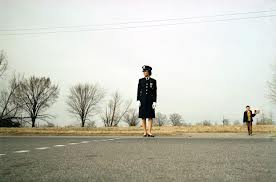The Crossing Guard Who Rules the World
In my town, there is a school crossing guard who stands at the corner of Noroton and Clock Avenues. She wears a crisp blue uniform and a limey yellow reflector vest. Under a black felt policewoman’s hat, her platinum grey hair drops straight to the nape of her neck.
I am clipping down Noroton Avenue, on my way home from a run to the bank. Maybe I’m five miles over the limit, but that’s when I see her. Cynthia. She’s staring at me. From 500 feet she somehow makes eye contact through my windshield! I tap the brake and try to slide by without further notice, but it’s not to be this morning. Cynthia calmly extends her hands and tamps down three times on my speedometer. I feel absolutely ashamed.
The power Cynthia holds over me is something I do not fully understand. She can “arrest” me with a withering gaze. And when I motor by just below the limit, her nod can affirm me as a model citizen. Inwardly I beam.
This is remarkable. She has enormous power and almost no authority. She does have a crisp uniform, and that counts for something. But she has no badge, so sidearm, no handcuffs jangling from her belt. She has no power to issue anybody a $100 ticket. All she has is her presence, there on Noroton Avenue.
And what a presence. There are crossing guards, and then there is Cynthia. She is not just standing on the beat, not just punching the clock. She is serious about this job, serious about safety. Technically, her job is to help all the kids who come down Clock Avenue to cross where there is no stop sign or light. She’s just supposed to help kids safely cross the street. But Cynthia has seized another level of authority with her job. She has made it her business to get folks in this town to slow down—even when there are no kids in sight!
The police have all kinds of authority and plenty of power to inflict punishment. They can pull you over, take 20 minutes of your time, sit there with lights flashing so that, for everyone driving by, you are a public example, and finally stick you with a stiff fine. But when the police pull me over, I don’t feel like I’ve failed my community; I’m usually just angry. It’s a game with a little radar toy and I just lost a hundred bucks.
But one look from Cynthia grabs my soul. Her power is inversely related to her authority. She has almost none of the latter, and yet scads of the former. What she has is power arising from moral authority. Her mild Medusa stare says, “Hey, don’t you care about children? What if your daughters were crossing this busy street every day—wouldn’t you want everybody to slow down and show some respect? Come on, we’re a town here; we have to work together. These kids are all our kids!” Cynthia has a silent way of making me want to be that kind of man.
Somehow we always believe that we’d have more power if someone would just invest us with a lot more authority—the external kind that people can see. Where the real thing is concerned, it’s just the opposite.

I loved this — what great thoughts. And thought-provoking. “Where the real thing is concerned, it’s just the opposite.” My CPE supervisor would always say, “Claim your authority!” Thank you, David.
That’s right–because you have it. It’s part of who you are…and you don’t need any of the trappings of “authority” to give it to you.
I don’t know why, but when you told the story of Cynthia, I thought of Richard Nixon and the Imperial Presidency. We have our fiefdoms, small or great, and we tend to want to expand them. Some expand them in self interest; some, like Cynthia, for the interest of others. Go Cynthia.